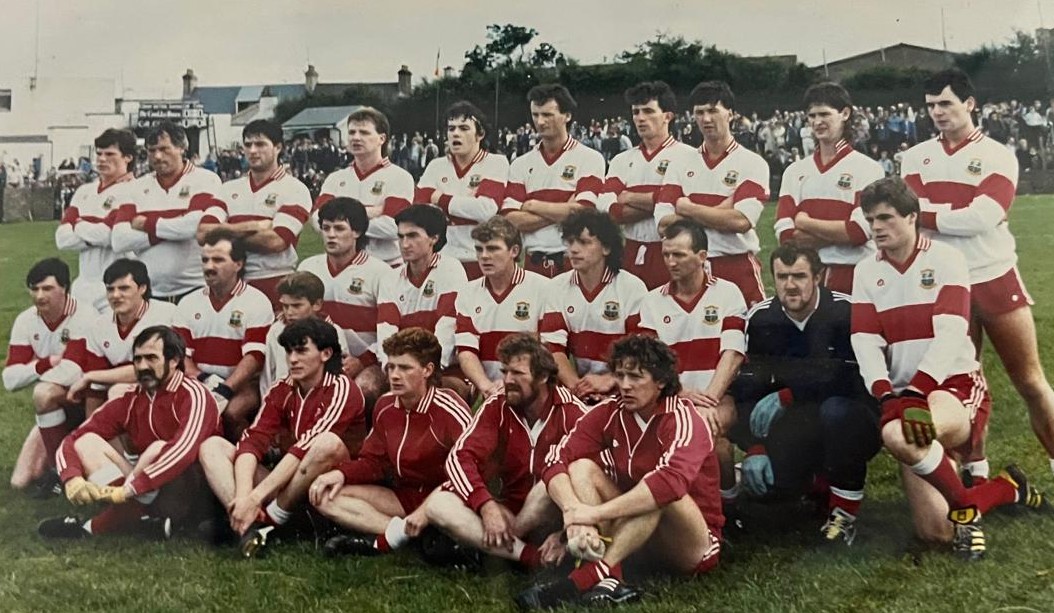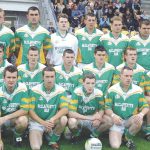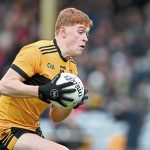Killybegs ended their 36-year wait by winning the 1988 Donegal title, one of five in a golden nine-year spell. John Cunningham was their winning captain in 1995. He spoke with Michael McMullan…
BY the time Barry Cunningham raised the Dr Maguire Cup, it was a bittersweet moment. Killybegs were Donegal champions of 1988. The famine was over.
In an era when south west was the footballing heartland, Killybegs cashed in on years of underage success.
Jimmy White, the man who coached many of the team, popped up to score the winning goal in a dramatic finale against rivals Kilcar.
It was only the beginning. They’d come close in Ulster three years later. Dr Maguire wintered in Fintra five times in nine years. Intertwined were final defeats to neighbours Naomh Columba and Kilcar.
1988 was bittersweet because it should’ve been Eamonn Byrne lifting the cup, something Barry Cunningham uttered in his acceptance speech.
Killybegs met Aodh Ruadh in a league game in late June that year. After suffering a heart attack that day in Fr Tierney Park, Eamonn tragically died with the game abandoned.
His wife Gemma was left to raise five young children. It rocked the community.
“It was fitting that we won the championship in Eamonn’s memory,” John Cunningham said.
As a group, they leaned on each other and kept their footballing focus on striving to win Donegal’s biggest prize.
Eamonn’s oldest son Eddie led the team out for the final against Kilcar having being part of the Killybegs squad that won the u-14 final beforehand.
Kilcar led the senior final for long spells. A Martin McHugh penalty kept them ahead. Barry Cunningham curled over a free from the tightest of angles. At the other end, James McHugh hooked a kick over his shoulder for a two-point lead.
There was still more time. John Cunningham burrowed through. Cousin Barry sent the cross into the square. When the ball was squared back, White applied the finish.
Barry McGowan kicked an insurance score before the final whistle ignited a week of celebrations.
Joy and relief, mixed with the thoughts of holding the biggest prize with Eamonn Byrne looking down on them. Smiling.
“You couldn’t get moving anywhere,” Cunningham remembers of the party back in Killybegs
“There was a parade coming in and the whole town seemed to be there and the whole community was there. I think it was a fitting way to finish the season for Eamonn.
“That was the starting point of our senior championship journey,” he added.
“It was pretty tough at the time but we were certainly lucky enough to win four more championships in the nineties.
“We’re very fortunate and we’re grateful that we had such a talented group of players and were able to achieve very good success for the club.”
During their path to the 1988 success, they rallied around each other. The club and the players wrapped their arms around each other.
“That was part of it,” he added of how they dealt with the loss of a teammate and friend.
“I suppose football was a great distraction as well and we had something to focus on.
“As a group, we felt that it was a way of dealing with the grief and all the sorrow that was around at the time.
“Eamonn obviously had a young family as well. There was the training and, I suppose, we started winning games.”
Killybegs lost to Pearse Óg in the Ulster campaign on home soil in Fintra to bring the curtain down on the year.
The pitch is now the Eamonn Byrne Memorial Park. There is a tournament in his name too. His memory is there forever.
****
John Cunningham was born in Shepherd’s Bush before moving from London in 1980.
By that time, he had missed u-12 football. It was all soccer and cricket but he made up for lost time.
Going in as a boarder in Falcarragh’s Pobalscoil Chloich Cheannfhaola, it wasn’t long before Father Seán Ó Gallchóir steered him around the first corner of a decorated GAA career.
John McGuinness, Francis Murray, Barry Cunningham and Barry McGowan were also part of the MacLarnon Cup success after winning the Loch An Iúir competitions down the school.
Back in Killybegs, it helped feed into an underage production line that hoovered up silver, including back-to-back Ulster Minor wins at St Paul’s.
Cunningham captained the 1985 Donegal team – managed by Jimmy White – to Ulster glory, one of seven Killybegs players on the squad who recently held a memorable reunion night. He also skippered the 1987 All-Ireland U-21 winning team.
On the team who beat the Kingdom in the final, John Cunningham was centre back. Barry and John Bán Gallagher were midfield. In attack, Manus Boyle and Barry McGowan completed the Killybegs five. Jimmy White was part of PJ McGowan’s management team.
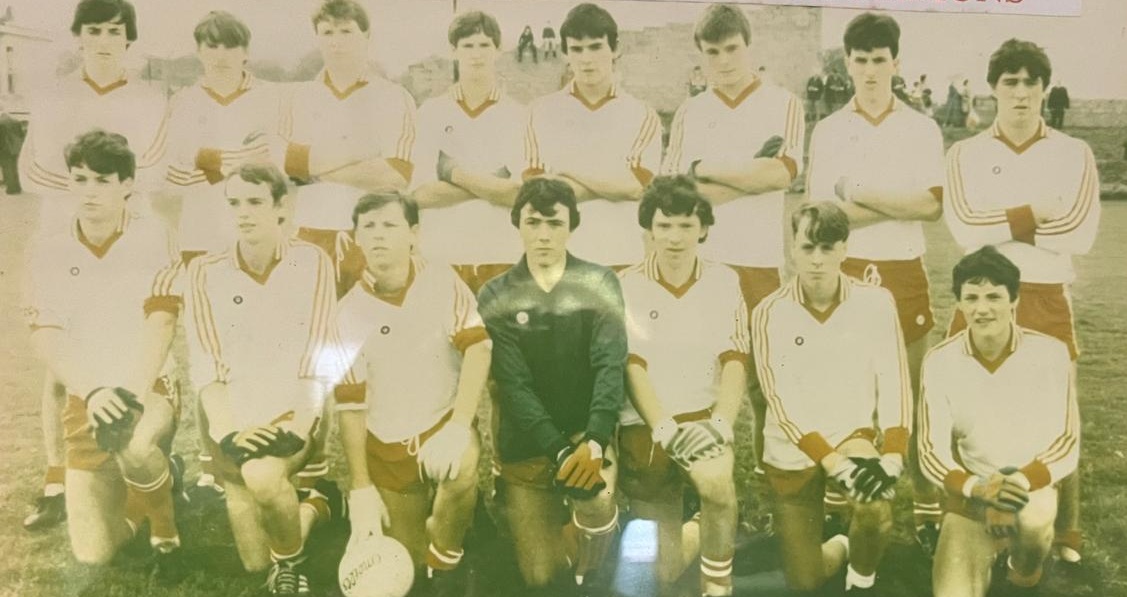
NO MINOR MATTER…Killybegs were winners of the Ulster minor title in 1984 and 1985
“We’re very fortunate with a very talented group of players that all came at the one time,” Cunningha, said of the core of their five senior championship winning group.
“Jimmy White was the man that started the whole ball rolling.
“He was the one that started training and he went to Gormanstown, and places like that, to do coaching.
“He wasn’t much older than us altogether. He was five or six years or seven years older than us.”
John Joe O’Shea was the winning senior manager in 1988. It was Pauric McShea in 1996. White was player-manager for the three senior titles in the middle.
“He was the mainstay at club level that brought everyone through,” Cunningham added.
“The biggest problem that we had, I suppose, as a club team, we always struggled for numbers.”
It was an excellent group of footballers, but a core of 18 or 19 players always left it a battle.
Add in the fishing industry. In the week of the 1991 Ulster final defeat to Castleblayney, seven players were offshore with some flying back from Norway for the game. Hardly ideal preparation.
“The fishing season now has totally changed with the quotas,” Cunningham added, himself a building contractor.
“Those lads would have started fishing in early August and they probably wouldn’t have stopped fishing at that time until well into April or May.”
That was the challenge. Football was important but fishing paid the bills. Their livelihood.
“I don’t think you would get too far now in the Ulster Club with the boys that weren’t able to fully commit to training,” added Cunningham, who went on to have a spell as the club’s manager.
Before 1988, Killybegs had one championship to their name, in 1952 with players from Kilcar on board, including Jim McHugh, father of Martin and James.
That ‘88 success was the first Killybegs title on their own two feet. Successive Ulster Minor successes at St Paul’s in Belfast gave them a foundation but it takes time.
They reached a senior semi-final in 1986 but seven Martin Carlin points and vital saves from Samuel Patterson saw Red Hugh’s squeeze the Fishermen out.
The following year, William Scales hit late goal as St Eunan’s clawed Killybegs back in the first leg of the first round before hitting a hat-trick in the return leg at O’Donnell Park. Killybegs were gone.
“Given the success that we’d been having, I suppose we felt that we should be winning everything,” Cunningham said.
“All these things, you put them into the bank and you learn from it. Ultimately then, what happened in ‘88, that galvanised us then to make the breakthrough.”
The average age of the 1988 team was in the 22 or 23 bracket. Mickey Campbell and Jimmy White’s older brother Kevin would’ve been the experience they’d have leant on initially.
“They were a bit older than us and they would have helped out immeasurably, but, by and large, it was a very young side at that stage.”
It was an era when Kilcar, Naomh Columba and Ardara were three other stellar teams on their doorstep.
“Every day we went out was a battle,” Cunningham said of the landscape they were breaking into.
“There were a lot of exceptional players around the south-west of Donegal at that time.
“All the championship games were very, very hard-fought. They were very hard to win.”
****
With age on their side, Killybegs had the tools for a sustained challenge. The key was getting the head down every winter with a belief of being in the shakeup for honours.
Barry Cunningham had spent time across the Atlantic and later had a spell in London where he helped Tír Conaill Gaels to within the bounce of a ball of derailing Lavey’s 1991 All-Ireland bid.
Earlier in the campaign, the Derry champions had to pull out all the stops in Ballybofey against a Naomh Columba team who beat Killybegs in the Donegal decider, ending their 12-year wait for a title.
“We regrouped then for ‘91 and thankfully we got over the line,” Cunningham said.
“Looking back, it (Ulster) wasn’t on our radar at all. We played Pearse Óg and they beat us up in Fintra.
“After the emotions of winning the championship, we really didn’t focus too much on it.”
Three years on, there was a focus on going as deep into Ulster as possible. A win over Dungiven got the ball rolling.
A semi-final win over Downpatrick came at a cost with an injury to John Bán Gallagher going into their showdown with Castleblayney.
“He tried to start the game but he wasn’t able to continue on,” Cunningham recalls.
“If you’re losing big players, they’re hard to replace, especially in club matches. It eats into your numbers and our numbers were always a bit small anyway.”
While goalkeeper, the late David Meehan, and Conor White flew home from Norway, via Scotland, from their fishing expedition days ahead of the final, others were unable to make the trip.
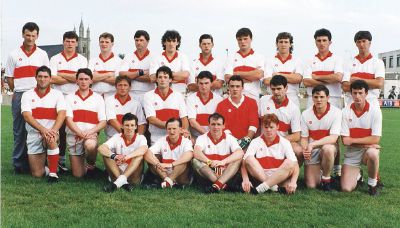
MEN OF ’91…The Killybegs team who won the 1991 title and reached the Ulster final
Three points each from Eugene ‘Nudie’ Hughes and Eamon McEneaney was enough for ‘Blayney in a 0-8 to 0-6 defeat after going three points ahead early on.
It was a heartbreaking end to the season but Killybegs were back as champions in Donegal the following season.
“There was a core of that team and we all grew up together,” Cunningham said of the bond.
Win or lose, they stuck together. There was success with Donegal for the county players but the togetherness of taking the Dr Maguire Cup home as a group was special.
Lavey edged them out of the 1992 Ulster campaign before seeing off Burren in the final.
It was another case of what might have been but, with three-in-a-row on the cards, Killybegs lost the Donegal decider to Kilcar the following year.
“Within 10 or 15 minutes,” Cunningham recalls of the ‘93 final, “I certainly would have realised that we were far from at our best.
“When you’re in that situation, it’s very hard to switch say ‘listen, it’s time to get going here’ and, ultimately, it didn’t happen.
“To be honest, Kilcar were more than worthy winners,” he admitted. “We certainly weren’t mentally up for the job because some of our lads thought it was a matter of just turning up. Unfortunately, that’s not the way it works.”
Everything has to fall into place to win a third successive title. Aodh Ruadh knocked them out in Kilcar in 1994 before Killybegs returned as champions the following year with John Cunningham as captain.
“It’s special but not really something I dwell too much on,” he said of lifting the cup in ’95. Killybegs winning is all that matters.
“There were seven or eight of our lads that were all big, strong characters. They were captains in their own right.
“Once we knuckled down and put our minds to it, things generally went fairly well for us.”
Pauric McShea was the at the helm as the 1996 campaign stepped through an incredible nine-game path to being crowned champions.
After losing to Aodh Ruadh at home in the first leg, without Barry McGowan, Killybegs turned the tables to force a third game and then a fourth. It was only the start.
Add in three attempts to step over Ardara in the quarter-final before wins over Kilcar and Naomh Columba capped off their monstrous season.
“That year we knuckled down really hard and thankfully we won a couple of games by a point,” Cunningham said.
“It was probably the hardest we’d trained of all the championships and it’s probably what got us over the line in the end.”
McShea, a native of Ballyshannon, was a new voice. They grew momentum that left them even harder to beat. Cunningham puts it down to trust in each other.
“Even if we were going down the stretch and were a point down, we never seemed to panic,” he said.
“Everybody knew the role and we were good at playing the big moments in games.”
A point down. A ball needing won. Often it was dirty ball. Someone would get it. The trust was there.
Goalkeeper David Meehan was man of the match in the final but his save in the second Aodh Ruadh game was crucial. It was a victory that turned the season. It was massive.
It took extra-time goals from Mark and Manus Boyle to bail them out of a third game.
“At that stage, most of the games were in Donegal Town on Saturday evenings,” Cunningham said.
“Dom Breslin (owner of the Abbey Hotel) used to look after us very well in the Abbey.”
There were away days against when both teams would flock into the same local hostelry. There’d be a few jars, a bit of slagging, marking the cards for a rematch down the line.
The second chance at three-in-a-row came in 1997 but in the year St Eunan’s ended their search for the title, Killybegs were knocked out by Kilcar.
Both finals since have ended in defeat, one of them to Naomh Conaill who they face this weekend in the preliminary quarter-finals.
Hugh McFadden bagged 2-4 last weekend, a goal off each foot with Eoghan Bán Gallagher, son of John, the man making the snowballs with those surging trademark runs.
They’ll be well versed in the club’s history. Eamonn Byrne Park reminds them of 1988 when the wheels started to turn on a golden era.
The memory of Davin Meehan. Men like John Bán, Barry McGowan and Barry Cunningham. Jimmy White’s goal to sink Kilcar on the magical autumnal Sunday in ’88.
It’s a long way from Shepherd’s Bush to Fintra, but John ‘Razda’ Cunningham and his winning crop have laid a foundation that’s always there.
In the hallway of his house is the most treasured of mementos. A framed collage of photos and medals. A Christmas gift from his daughter.
The Killybegs story, there for everyone to see. History never forgets.
• For the full interview with John, tune into this week’s edition of Gaelic Lives, available now on YouTube and Spotify
Receive quality journalism wherever you are, on any device. Keep up to date from the comfort of your own home with a digital subscription.
Any time | Any place | Anywhere




